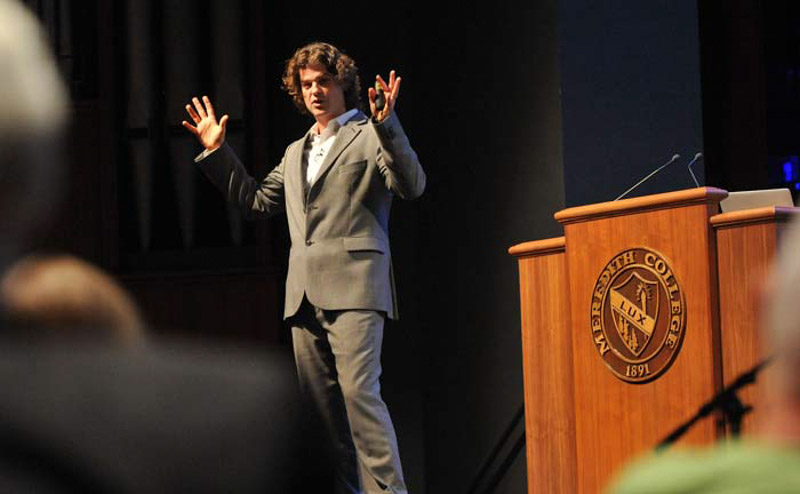Dog Cognition Expert Brian Hare Visits Meredith
- Published

Scientist and New York Times bestselling author Brian Hare spoke on Meredith’s campus on Tuesday, October 11, 2016. In addition to an evening lecture, he visited a research methods class, held an informal Q&A, and joined a group of students, faculty, and staff for dinner.
Hare, who is an associate professor of evolutionary anthropology at Duke University and the founder of the Duke Canine Cognition Center, presented a lecture titled “Survival of the Friendliest” on Tuesday evening.
Hare’s lecture focused on two primary questions: “What is it that makes us human?” and “How did we get that way?”
Unlike a traditional view of intelligence that assumes some species are “more” or “less” intelligent, a cognitive-evolutionary approach examines the profiles of various species, and considers why they were designed that way and for what purpose.
“People always ask me which species is smarter – I tell them that’s like asking which is a better tool, a screwdriver or a hammer?” said Hare, pointing out that it depends on the job at hand.
“That is how evolution works; a particular species evolved because it was useful in different ways,” said Hare.
Hare traced his own research path, which began at the age of 19 when he posed a groundbreaking hypothesis to a professor about his childhood dog’s ability to communicate.
His professor challenged him to pursue his assertion and helped him design a series of tests to determine whether he was right. He found that dogs are in fact very good at understanding gestures, a critical step in human language development.
“It turns out that dogs are remarkable at doing this exact thing that we thought was unique to humans,” said Hare.
As a result of that research, he co-authored his first paper with the professor, Michael Tomasello, and discovered that he loved science, which he describes as “equal opportunity.”
“Science isn’t about proving things. It’s not about being right – it’s about being delighted when you’re wrong.”
In his lecture, Hare discussed his research on a number of species, including bonobos, foxes, and, of course, dogs. He has found that the characteristic of friendliness has a surprising effect on their ability to survive – and thrive. For instance, foxes that were selected because they were friendly developed a whole suite of other characteristics.
“If you want to select for a more clever fox, select for a nice fox,” said Hare.
He observed that among humans this evolutionary process has had an unfortunate side effect of creating a strong sense of protectiveness for those who resemble us, while it can create antipathy for those who don’t.
“The mechanism that makes us the kindest species also makes us the cruelest species on the planet,” said Hare.
Hare also noted that a liberal arts education is particularly effective from a cognitive perspective.
“The job in college is to figure out how you can be useful. Once I have identified my gift, how can I make the most of that gift?”
Brian Hare’s first book, The Genius of Dogs, is a New York Times bestseller. His research has consistently received national and international media coverage including The New York Times, The New Yorker, National Geographic, Time, Nature, Wired, Science magazine, CNN, and ABC.
News Director
316 Johnson Hall
(919) 760-8087
Fax: (919) 760-8330
PRINCETON REVIEW
U.S. NEWS
NICHE
3800 Hillsborough Street Raleigh, NC 27607-5298 | (919) 760-8600 Fax: (919) 760-8330 | © 2024 All Rights Reserved.